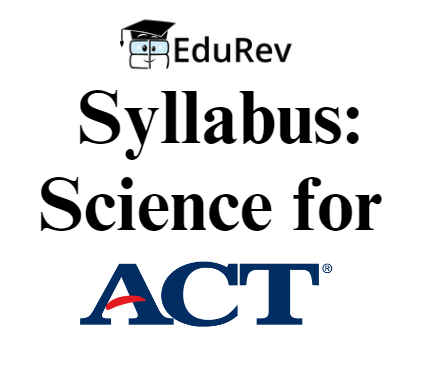| Table of contents |

|
| Overview |

|
| Detailed Syllabus |

|
| Scoring and Reporting Categories |

|
| Types of Questions |

|
| Tips for Science Section |

|
The ACT consists of 4 tests (English, Math, Reading, and Science) and an optional Writing test (Essay). The duration of the ACT is 3 hours 35 minutes with the essay and 2 hours 55 minutes without the essay. There are two breaks in the test.

Overview
The science section assesses skills like interpretation, analysis, evaluation, reasoning, and problem-solving needed in natural sciences. It presents real scientific scenarios followed by multiple-choice questions. Content covers biology, chemistry, Earth/space sciences (like geology, astronomy, and meteorology), and physics. Advanced knowledge isn't necessary, but some background from general science courses might be helpful for certain questions.
Detailed Syllabus
- The science section contains a total of 40 multiple-choice questions from 7 passages. The passage topics revolve around physics, chemistry, biology, and earth sciences and include tables, charts, and graphs.
- Tasks within this section require candidates to:
- Grasp fundamental features and concepts related to the provided information.
- Conduct critical analysis of the relationship between the provided information and the conclusions or hypotheses drawn.
- Employ generalization from given information to derive new insights, conclusions, or predictions.
- Notably, candidates are not allowed to use calculators during this section.
Scoring and Reporting Categories
Upon completion of the science section, four scores are reported:
- Overall score for the entire section.
- Three category scores based on scientific knowledge, skills, and practices.
These categories and their approximate percentage allocations are as follows:
Interpretation of Data (40–50%)
- Tasks in this category involve manipulation and analysis of scientific data presented in various formats such as tables, graphs, and diagrams.
- Skills assessed include recognizing trends in data, translating tabular data into graphs, interpolating and extrapolating, and reasoning mathematically.
Scientific Investigation (20–30%)
- This category focuses on understanding experimental tools, procedures, and design.
- Candidates are expected to identify controls and variables and to compare, extend, and modify experiments.
Evaluation of Models, Inferences, & Experimental Results (25–35%)
- Tasks within this category revolve around judging the validity of scientific information and formulating conclusions and predictions based on it.
- Candidates must determine which explanation for a scientific phenomenon is supported by new findings.
Types of Questions
The science section presents information in three formats:
Data Representation (25–35%)
- This format includes graphic and tabular material commonly found in science journals and texts.
- Questions associated with this format test skills such as recognizing relationships among data, interpolation and extrapolation, and translating tabular data into graphs.
Research Summaries (45–60%)
- This format presents descriptions and results of experiments.
- Questions focus on the design of experiments and the interpretation of experimental results.
Conflicting Viewpoints (15–20%)
- This format presents multiple explanations for the same scientific phenomena, which may be inconsistent due to differing premises or incomplete data.
- Questions concentrate on understanding, analyzing, and comparing alternative viewpoints or hypotheses.
Tips for Science Section
Reading the Passage Carefully
- Before answering any questions, thoroughly read the scientific material provided.
- Ensure you read the entire text, including any accompanying tables, graphs, or figures.
- Take notes on important ideas, especially for passages describing experiments.
- Consider the experimental design, including controls and variables, as questions may address this aspect of scientific research.
Noting Different Viewpoints
- Be aware that some passages may present conflicting viewpoints.
- Questions may ask you to distinguish among these viewpoints.
- Taking notes summarizing each viewpoint for specific sections of the passage can be helpful.
FAQs on Syllabus: Science for ACT
| 1. What topics are covered in the Science section of the ACT? |  |
| 2. How many questions are there in the Science section of the ACT? |  |
| 3. Are calculators allowed in the Science section of the ACT? |  |
| 4. How can I improve my score in the Science section of the ACT? |  |
| 5. Can I skip questions in the Science section of the ACT? |  |















